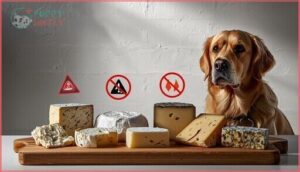This site is supported by our readers. We may earn a commission, at no cost to you, if you purchase through links.
Your dog just snatched a chunk of blue cheese from your charcuterie board. Within minutes, you might face a veterinary emergency.
Blue cheese contains roquefortine C, a neurotoxin produced by Penicillium mold that can trigger seizures and tremors in dogs. Even small amounts pose serious risks because this compound crosses directly into neural tissue and interferes with liver enzymes.
The high fat content adds another layer of danger, stressing your dog’s digestive system and potentially causing pancreatitis. Unlike other cheeses that might only cause mild stomach upset, blue cheese stands in a category of genuine toxicity that demands immediate attention and prevention strategies.
Table Of Contents
- Key Takeaways
- Blue Cheese is Toxic to Dogs
- Symptoms of Blue Cheese Poisoning in Dogs
- What to Do if Your Dog Eats Blue Cheese
- Safe Cheese Alternatives for Dogs
- Preventing Blue Cheese Accidents at Home
- Frequently Asked Questions (FAQs)
- Which foods are most toxic to dogs?
- What happens if my dog eats blue cheese?
- What cheeses should dogs avoid?
- What to do if my dog eats blue cheese reddit?
- Can dogs and cats eat blue cheese?
- How much blue cheese is too much for dogs?
- Are there any health benefits to dogs from blue cheese?
- Why is blue cheese toxic, unlike other cheeses?
- Can blue cheese be used as a training treat?
- Can blue cheese dressing harm my dog?
- Conclusion
Key Takeaways
- Blue cheese contains roquefortine C, a neurotoxin from Penicillium mold that can trigger seizures and tremors in dogs even in small amounts.
- Symptoms of blue cheese poisoning range from vomiting and diarrhea to serious neurological issues like seizures, typically appearing within 30 minutes to 24 hours after ingestion.
- If your dog eats blue cheese, monitor them closely for warning signs and contact your veterinarian immediately if they show symptoms like tremors, repeated vomiting, or lethargy.
- Safe cheese alternatives for dogs include cottage cheese, mozzarella, and cheddar in small portions, while blue cheese and moldy varieties should always be avoided.
Blue Cheese is Toxic to Dogs
Blue cheese isn’t just a questionable choice for your dog—it’s genuinely dangerous.
The high fat content can lead to pancreatitis, and certain molds in blue cheese can be toxic to dogs if consumed in larger amounts.
The mold that gives this cheese its distinctive flavor and appearance can produce toxins that harm dogs in ways that go beyond simple digestive upset.
Let’s look at what makes blue cheese so risky for your four-legged friend.
What Makes Blue Cheese Dangerous
Blue cheese toxicity comes from a specific fungal growth called Penicillium mold. This mold creates the signature blue veins during aging but also produces roquefortine C, a dangerous compound for dogs.
Blue cheese contains Penicillium mold that produces roquefortine C, a dangerous neurotoxin for dogs
Beyond mold toxins, blue cheese packs high fat content that stresses your dog’s digestive system. These cheese additives and toxin effects make blue cheese one of the toxic foods for dogs you should always avoid.
For more on the role of Penicillium mold in cheese production, see resources on blue cheese safety.
Roquefortine C: The Primary Toxin
That specific compound—roquefortine C—is a mycotoxin produced during fungal growth in blue cheese. It acts as a neurotoxin in dogs, triggering serious dog health risks:
- Convulsant effects even in moderate exposures
- Interaction with liver enzymes affecting metabolism
- Ability to cross into neural tissue
- Co-occurrence with other toxic compounds
- Variable concentrations between cheese batches
This cheese toxicity makes blue cheese particularly dangerous for your pet. Learn more about the presence of roquefortine C and its health implications for pets.
High Fat Content and Lactose Issues
Beyond the toxin itself, blue cheese packs a double punch: high fat and lactose. Fat intolerance can trigger pancreatitis in vulnerable dogs, especially when they grab a large chunk. Lactose sensitivity causes vomiting and diarrhea since most dogs can’t digest dairy products well. Together, these canine nutrition challenges compound dog health risks.
| Issue | What Happens | Risk Level |
|---|---|---|
| High Fat | Pancreatic stress, inflammation | Moderate to High |
| Lactose | GI upset, digestive distress | Variable by dog |
| Combined | Compounded symptoms, worse outcomes | High |
For nutritional guidance and dairy alternatives that won’t stress your dog’s system, check safer options below.
Symptoms of Blue Cheese Poisoning in Dogs
If your dog gets into blue cheese, you need to know what to watch for. The symptoms can range from mild stomach upset to serious neurological problems.
If your dog also reacts badly to other dairy-based foods, check out signs your dog might have a dairy allergy to understand what’s happening.
Here’s what blue cheese poisoning looks like in dogs and how fast these signs usually show up.
Vomiting and Diarrhea
Vomiting and diarrhea are often your dog’s first red flags after eating blue cheese. These symptoms signal canine gastrointestinal health disruption from toxicity.
Watch for these key dehydration signs:
- Dry gums and nose indicating fluid balance problems
- Rapid watery stools requiring diarrhea management
- Multiple vomit triggers within hours
- Sunken eyes in severe cases
- Reduced urination needing hydration tips
Small amounts might cause mild upset, but repeated episodes demand immediate veterinary attention.
Seizures and Tremors
Roquefortine C can trigger dangerous neurological signs in your dog’s brain activity. Seizures from blue cheese toxicity often start with muscle stiffening, followed by uncontrolled jerking.
You might also notice tremor types ranging from mild shaking to full-body convulsions. These canine health risks demand immediate emergency response. Don’t wait if seizure triggers appear—contact your vet or emergency clinic right away for veterinary guidance.
Increased Body Temperature and Lethargy
Your dog’s internal thermostat can go haywire after eating blue cheese. Fever symptoms and elevated body temperature often pair with profound weakness—your pup may seem drained of energy.
Watch for these warning signs of toxicity:
- Body temperature climbing above 102.5°F (normal is 101-102.5°F)
- Excessive panting or heat stroke risk
- Refusal to move or play
- Warm ears and paws
- Complete loss of appetite
These fatigue factors signal serious canine health risks requiring immediate veterinary attention.
How Quickly Symptoms Appear
Usually, symptoms can strike anywhere from 30 minutes to 24 hours after your dog eats blue cheese. Toxin absorption and reaction timing depend on how much they ate and their individual sensitivity.
| Exposure Factors | Symptom Onset Window |
|---|---|
| Small amounts | 6-24 hours (mild digestive upset) |
| Moderate portions | 2-6 hours (vomiting, diarrhea) |
| Large servings | 30 minutes-3 hours (tremors, seizures) |
| High sensitivity | 15 minutes-2 hours (rapid toxicity) |
| Toxicity thresholds exceeded | 5-30 minutes (emergency food poisoning signs) |
Early warning signs like drooling or restlessness often appear before full-blown digestive upset.
What to Do if Your Dog Eats Blue Cheese
If your dog sneaks a bite of blue cheese, don’t panic but don’t brush it off either.
The next steps depend on how much they ate and what symptoms show up. Here’s what you need to do to keep your dog safe and know when it’s time to call the vet.
Assessing The Amount Consumed
When your dog sneezes a bite of blue cheese, the first step is figuring out exactly how much they ate. Cheese quantity matters because toxin intake depends on exposure levels and dog size factors.
If your pup weighs 10 pounds, even a teaspoon can pose toxicity risks. Note the ingestion timing and estimate the amount consumed to gauge potential food toxicity danger.
Monitoring for Warning Signs
After your dog eats blue cheese, keep a close watch for the next 24 hours. Essential Sign Checks and Temperature Monitoring help you catch Early Warning Systems before they escalate.
Check Hydration Status by feeling gums for dryness. Behavioral Changes like pacing or hiding signal Food Toxicity from Toxic Foods. Food Hazards for Dogs and Lactose Intolerance can show up fast, so stay alert.
When to Contact Your Veterinarian
If your dog shows any worrisome signs after eating blue cheese, don’t wait. Immediate Veterinary Care can prevent serious complications from Food Hazards for Dogs.
Contact your vet if you notice:
- Vomiting within two hours – suggests Toxicity Levels rising quickly
- Tremors or seizures – Emergency Protocols apply here
- Lethargy or refusal to drink – signals urgent Symptom Assessment needed
- Known health issues like pancreatitis – higher risk with Lactose Intolerance
Vet Visit Preparation starts with noting how much your dog ate and when.
Emergency Veterinary Care
When your pet needs Emergency Response, Veterinary Care teams act fast. Toxic exposures require immediate Veterinary Intervention, including decontamination and Canine First Aid measures.
| Emergency Action | Purpose |
|---|---|
| IV fluids | Aids organs and flushes toxins |
| Seizure medication | Controls tremors quickly |
| Gastric lavage | Removes undigested blue cheese |
| Monitoring | Tracks heart rate and temperature |
Pet Hospitalization provides round-the-clock Toxicity Treatment for Dog Health and Nutrition recovery.
Safe Cheese Alternatives for Dogs
If you want to give your dog a cheesy treat without the risks, you have safer options to choose from.
Not all cheese is off-limits, but some types work better than others for dogs. Here’s what you can feel good about offering and what you should still keep off the menu.
Cottage Cheese: Low Lactose Option
If your pup struggles with lactose intolerance, cottage cheese stands out among dairy products as a smart pick. This low fat option delivers excellent protein content—about 25 grams per cup—while containing less lactose than many cheeses.
Some lactose free versions exist for sensitive stomachs. The dairy benefits include calcium for bones, making cottage cheese a practical treat when you’re mindful of dog nutrition and cheese nutrition basics.
Mozzarella and Cheddar in Moderation
Beyond cottage cheese, you can offer small bites of mozzarella or cheddar without worrying too much. Mozzarella is often gentler on lactose intolerance because it carries lower lactose levels than many cheeses.
Cheddar works too, though its fat content runs higher—around 9 grams per ounce. Keep portions tiny to support healthy snacking and balanced dog nutrition. These dairy alternatives won’t turn toxic like blue cheese.
Goat’s Milk Cheese Benefits
Goat’s milk cheese stands out for dogs with lactose intolerance because it carries less lactose than cow dairy products. The nutrient profile delivers calcium for bone support and protein your dog needs.
Some varieties include probiotic effects that help digestive health. Fat content stays moderate, making it gentler than toxic blue cheese. Just keep portions small to avoid upsetting your pup’s stomach.
Cheeses to Always Avoid
Blue cheese tops the list of toxic cheese types you must keep away from your dog. Moldy cheese dangers extend beyond blue varieties, so watch for these high-risk foods:
- Blue cheese – Contains fungal toxins like roquefortine C
- Roquefort – High toxicity from mold compounds
- Brie and Camembert – Risk bacterial contamination
- Stilton – Similar dangers as blue cheese
- Gorgonzola – Toxic mold effects
Cheese allergies and lactose intolerance add extra concerns.
Preventing Blue Cheese Accidents at Home
The best defense against blue cheese toxicity is keeping it away from your dog in the first place.
A few simple habits can prevent accidents before they happen.
Here’s how to create a safer home environment for your pet.
Proper Food Storage Practices
Treating your kitchen like a fortress protects your dog from toxic mishaps. Store blue cheese and other risky foods in airtight containers on the top shelf, well out of paw’s reach.
Keep your refrigerator at 1 to 4°C to maintain food safety for pets. Label containers clearly and use FIFO rotation—first in, first out—so you’ll always know what’s safe and what’s reached its shelf life.
Educating Family Members and Guests
Everyone in your home needs to know the rules about blue cheese and other toxic foods. Brief guests before they arrive and explain which snacks can harm your dog.
Clear communication about pet care advice and safe food handling keeps accidents at bay. A quick household rundown on dog food safety and lactose intolerance in dogs protects your pup during family gatherings.
Safe Treat Options for Your Dog
Skip the cheese board and reach for single-protein treats that support dog nutrition and wellness instead. Small cubes of plain cooked chicken or carrots meet canine dietary needs without triggering lactose intolerance in dogs.
These healthy snack ideas align with food safety for dogs and treat allergy prevention. Follow dog nutrition tips that prioritize lean protein and minimal fillers in your canine diet plans for better cheese and dog health outcomes.
Frequently Asked Questions (FAQs)
Which foods are most toxic to dogs?
Your pup’s kryptonite includes chocolate, grapes, xylitol, onions, and macadamia nuts—each triggers serious reactions.
These toxic substances damage organs, cause seizures, or spark dangerous insulin drops requiring immediate veterinary intervention.
What happens if my dog eats blue cheese?
Your dog may develop vomiting, diarrhea, or tremors from blue cheese mold poisoning.
Roquefortine C toxin affects canine health rapidly.
Watch for seizures or fever and contact your vet immediately if symptoms appear.
What cheeses should dogs avoid?
Your dog should steer clear of blue cheese and any variety containing mold, garlic, onion, or chives.
These toxic cheese types pose serious pet food safety risks beyond simple lactose intolerance or dairy products and dogs concerns.
What to do if my dog eats blue cheese reddit?
If your dog ate blue cheese, check how much they consumed and watch for vomiting, tremors, or diarrhea.
Contact your vet or Pet Poison Helpline immediately if symptoms appear or a large amount was eaten.
Can dogs and cats eat blue cheese?
Both cats and dogs face serious risks from blue cheese due to fungal mycotoxins like roquefortine C.
Pet sensitivity varies, but species differences don’t change the reality: this food isn’t safe for either animal.
How much blue cheese is too much for dogs?
There isn’t a truly safe consumption limit for blue cheese. Even small amounts can trigger vomiting or diarrhea in sensitive dogs, while larger quantities increase the risk of tremors and seizures from roquefortine C.
Are there any health benefits to dogs from blue cheese?
While blue cheese contains calcium sources and energy boosters like protein, the severe toxicity risks far outweigh any nutrient benefits.
Safer alternatives provide the same nutrition without threatening your dog’s health or triggering dairy allergy concerns.
Why is blue cheese toxic, unlike other cheeses?
Most cheeses are safe in small amounts, but blue cheese contains Penicillium mold that produces roquefortine C during cheese aging.
This toxic compound formation creates fungal toxins that trigger seizures and vomiting in dogs.
Can blue cheese be used as a training treat?
It’s definitely not a smart move for dog training. The toxicity levels and training treat risks make blue cheese unpredictable.
Stick with safe rewards designed for canine obesity prevention and food safety for dogs.
Can blue cheese dressing harm my dog?
Yes, blue cheese dressing poses serious toxicity risks for your dog.
The roquefortine C toxin, high fat content, and lactose can trigger vomiting, diarrhea, seizures, and even pancreatitis—threatening your pet’s safety.
Conclusion
A single crumble of blue cheese could turn your dog’s cozy evening into a midnight race to the emergency vet. Unlike harmless treats, this moldy delicacy packs roquefortine C—a toxin that doesn’t negotiate with your pet’s nervous system.
You can’t undo what’s already been swallowed, but you can control what happens next. Store it securely, educate everyone in your household, and remember: when asking “can dogs eat blue cheese,” the answer is always no.
- https://todaysveterinarypractice.com/toxicology/practical-toxicologytremorgenic-mycotoxin-intoxication-dogs/
- https://www.petmd.com/dog/nutrition/can-dogs-eat-cheese
- https://pmc.ncbi.nlm.nih.gov/articles/PMC339273/
- https://www.onehealth.org/blog/how-to-know-when-to-take-your-dog-or-cat-to-the-vet
- https://www.ncbi.nlm.nih.gov/pmc/articles/PMC339273














